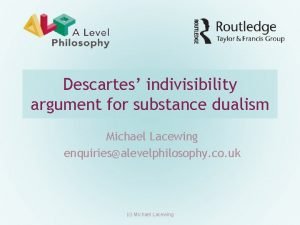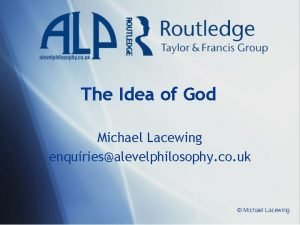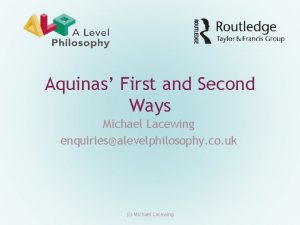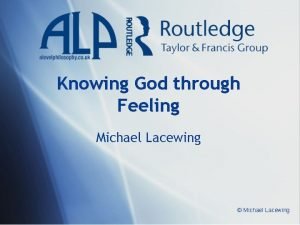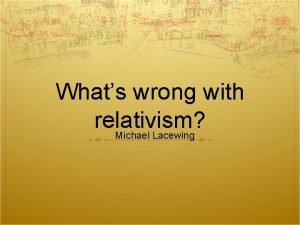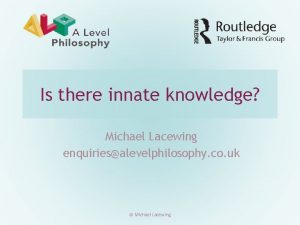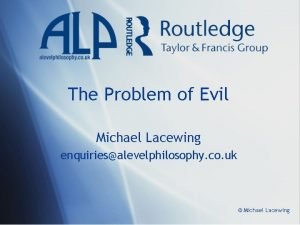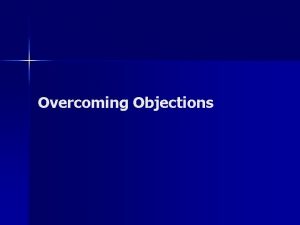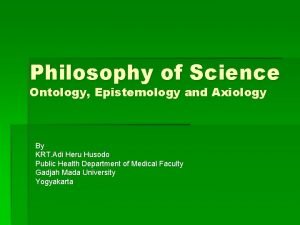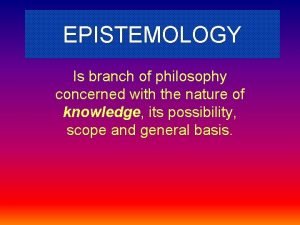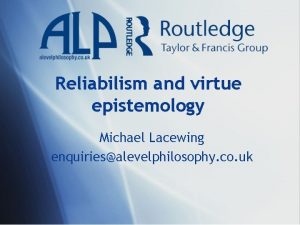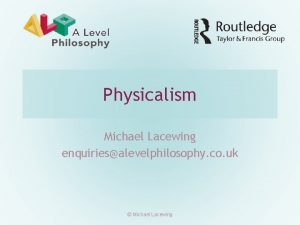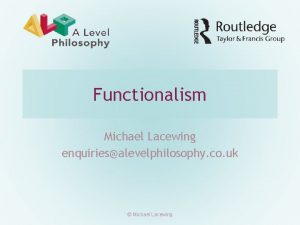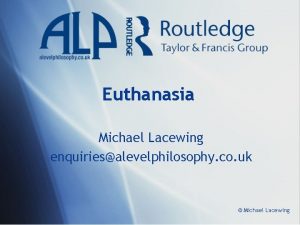Virtue epistemology Michael Lacewing enquiriesalevelphilosophy co uk Michael









- Slides: 9

Virtue epistemology Michael Lacewing enquiries@alevelphilosophy. co. uk © Michael Lacewing

Virtue epistemology • You know that p if – p is true; – You believe that p; and – Your true belief is a result of you exercising your intellectual virtues. • Intellectual virtue: an intellectual skill or ability or trait that contributes to getting to the truth. • The fact that you have a true belief is a ‘cognitive achievement’ for which you deserve ‘credit’. © Michael Lacewing

Zagzebski’s analysis • You know that p if – you believe that p; – your belief that p arises from an act (or acts) of intellectual virtue • Virtue: a state of a person that is good by way of helping the person achieve some good purpose or goal – Moral virtues: well-being – Epistemic/intellectual virtues: truth © Michael Lacewing

Virtue • A virtue motivates us to pursue what is good – We care about believing what is true • A virtue enables us to be successful – The ability to reliably form true beliefs • E. g. open-minded: we are disposed to carefully consider views that conflict with our own and able to do so successfully © Michael Lacewing

Two conditions on ‘good’ belief • A true belief is not completely good if it is only accidentally true – Cp. an act is not completely morally good if it is not done with good intentions, even if it helps someone • A belief that arises from exercising intellectual virtue is not completely good if false – Cp. an act is not completely morally good if it fails to achieve its aim, even if it is done with good intentions © Michael Lacewing

Acts of intellectual virtue • An act of virtue succeeds and does so because it is done as the virtuous person would do it – In an act of intellectual virtue, the person arrives at a true belief that is true because it is the result of exercising their intellectual virtues (or if they don’t have the virtues, thinking like someone who does) • Knowledge is belief arising from acts of intellectual virtue – Truth isn’t a separate condition, but already covered by the definition of ‘act of intellectual virtue’ © Michael Lacewing

A Gettier case • Smith shows all the symptoms of having virus X, which lab tests confirm. Dr Jones believes Smith has virus X. However, the symptoms and lab results are caused by unknown virus Y. But Smith has just caught virus X. So Jones’ belief is true and the result of exercising intellectual virtues (careful examination, lab tests, etc. ), but isn’t knowledge. • Not a counterexample: While Jones exercised her intellectual virtues, her belief isn’t true because she exercised her virtues © Michael Lacewing

A second Gettier case • Henry in Barn County: Henry believes ‘there’s a barn’ when looking at the only real barn in a countryside full of barn facades, but he also believes ‘there’s a barn’ when looking at the barn facades. If good vision and care in looking are intellectual virtues, then his belief is the result of his exercising intellectual virtues, but is only accidentally true. • Two possible responses: – Henry’s belief isn’t true because he exercised his virtues – Henry does know the barn is a barn, because he did arrive at a true belief because he exercised his virtues • Objection: what does it mean to say a belief is true because it arises from acts of intellectual virtue? © Michael Lacewing

Two objections • Can children and animals exercise intellectual virtues? – Yes – there can be undemanding virtues where one’s concern for the truth is simply shown in looking around • Motivation and knowledge – If someone is rarely motivated to care for the truth, but on an occasion, out of character, carefully researches some topic – do they have knowledge? – Do motives really matter, as long as the activity used reliably produces true belief? © Michael Lacewing
